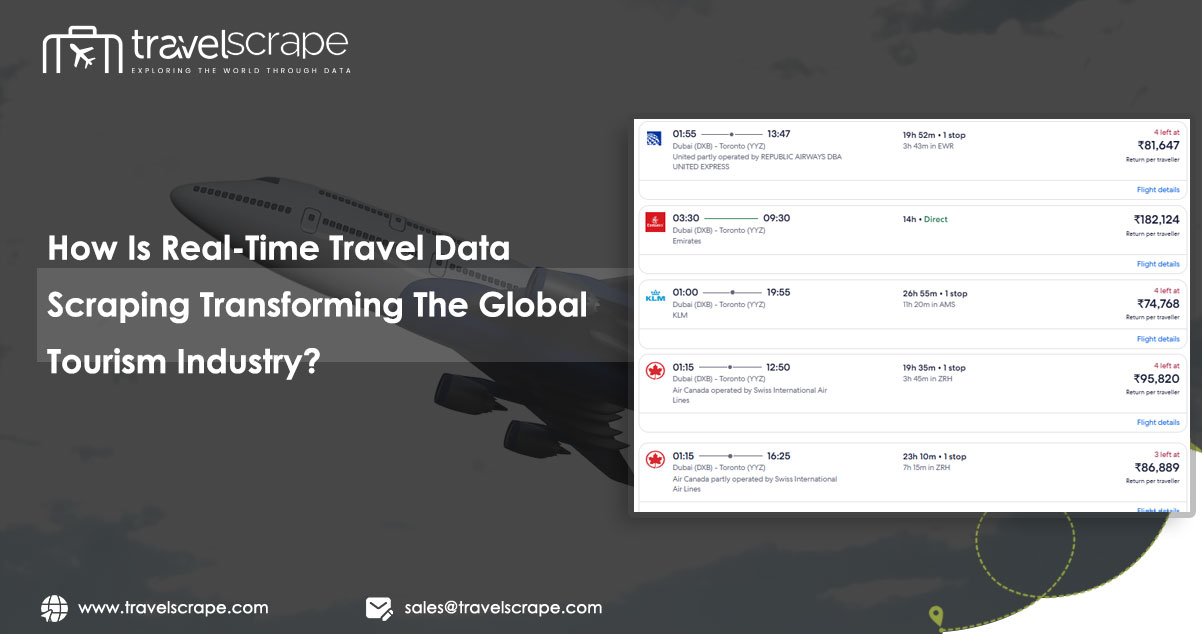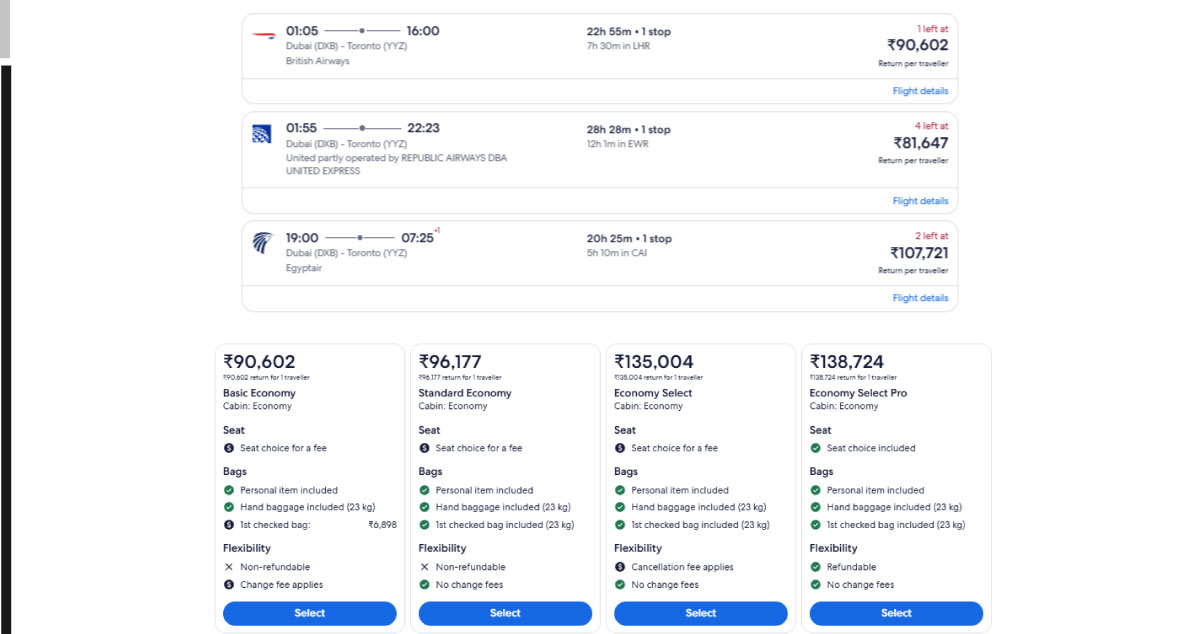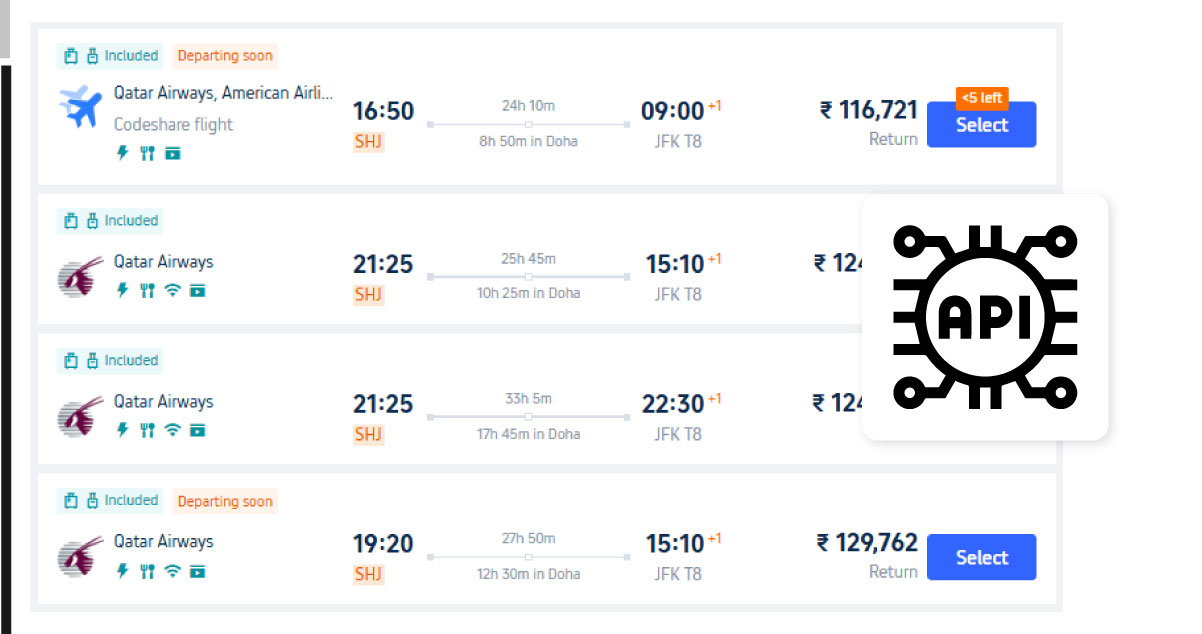How Is Real-Time Travel Data Scraping Transforming The Global Tourism Industry?

Introduction
The global tourism industry is experiencing a revolutionary transformation through technology-driven solutions that have fundamentally changed how businesses operate, compete, and serve customers. At the forefront of this digital revolution lies Real-Time Travel Data Scraping, a powerful technology that enables travel companies to access, analyze, and leverage vast amounts of information instantaneously. This technological advancement is not merely an enhancement to existing systems; it represents a complete paradigm shift in how tourism businesses understand market dynamics, customer preferences, and competitive landscapes.
Today’s travelers demand seamless experiences, competitive prices, and tailored recommendations. To meet these expectations, businesses need real-time insights from
diverse platforms, destinations, and service providers. Traditional data methods fall short in tracking fast-changing trends in pricing, availability, and sentiment. Integrating advanced technologies like those used to gather a Top Travel Destinations Dataset helps convert raw data into actionable intelligence that fuels smarter decisions and business growth.
The Evolution of Data-Driven Tourism

The tourism industry has changed significantly over the past decade, evolving from traditional booking methods to sophisticated digital ecosystems. Modern businesses now rely on advanced Travel Intelligence Tools as essential to this transformation, enabling informed decisions based on comprehensive market analysis.
These tools provide:
- Aggregated information from multiple booking platforms and service providers.
- Comprehensive market condition analysis and competitor strategy insights.
- Real-time consumer behavior pattern recognition and trend identification.
- Automated data processing capabilities that eliminate manual research efforts.
Strategic decision-making in the travel industry now relies heavily on sophisticated Tourism Analytics as the backbone of operational excellence.
Modern analytical frameworks deliver:
- Advanced booking pattern analysis that reveals seasonal and demographic trends.
- Predictive modeling capabilities for demand forecasting and inventory management.
- Real-time market condition monitoring across multiple geographical regions.
- Integration capabilities that connect analytical insights with operational systems.
The growing complexity of the travel industry has rapidly accelerated the shift toward data-driven operations. Manual monitoring is no longer feasible, and countless airlines, hotels, and service providers frequently update their offerings. Dynamic Travel Systems powered by automation now play a crucial role in processing real-time data, ensuring operational efficiency and a strong competitive edge.
Instant Pricing Intelligence and Market Dynamics
One of the most significant impacts of modern data collection technologies is the ability to implement comprehensive Instant Pricing Updates across all aspects of travel services. The travel industry is characterized by dynamic pricing models where rates can change multiple times daily based on demand, seasonality, competitive actions, and other factors.
Continuous information streams are now available through sophisticated Travel Data Feeds that provide pricing information from multiple sources, enabling travel companies to maintain accurate and competitive pricing structures.
These feeds deliver:
- Real-time pricing updates from airlines, hotels, and car rental companies.
- Comprehensive rate comparison data across multiple service providers.
- Automated inventory tracking that reflects current availability status.
- Integration capabilities with existing revenue management systems.
The implementation of automated pricing systems has transformed revenue management approaches by offering:
- Dynamic pricing adjustments based on real-time market conditions.
- Competitive rate monitoring that enables immediate response to market changes.
- Historical trend analysis that informs strategic pricing decisions.
- Seasonal demand forecasting optimizes revenue potential during peak periods.
Predictive Analytics and Future Planning

The integration of advanced Predictive Analytics In Travel has revolutionized how tourism businesses approach strategic planning and operational management. By analyzing historical patterns, current trends, and external factors, predictive models can forecast demand fluctuations, identify emerging destinations, and anticipate customer needs before they become apparent through traditional market research methods.
Modern travel operations now utilize sophisticated Dynamic Travel Systems that leverage predictive analytics to optimize various aspects of travel operations, delivering:
- Inventory management optimization based on predicted demand patterns.
- Marketing campaign targeting that aligns with forecasted customer behavior.
- Route planning optimization that considers multiple operational factors.
- Resource allocation strategies that maximize efficiency and profitability.
The application of predictive analytics extends beyond demand forecasting to encompass multiple operational areas:
- Risk management protocols that anticipate and mitigate potential disruptions.
- Route optimization systems that improve operational efficiency and customer satisfaction.
- Customer experience enhancement through personalized service delivery.
- Revenue optimization strategies that balance demand forecasting with pricing models.
Real-Time Market Intelligence and Competitive Analysis
Businesses can now access comprehensive Real-Time Tourism Analytics that provides immediate insights into market conditions, competitor activities, and customer behavior patterns. This real-time capability is crucial in an industry where market conditions change rapidly due to economic conditions, political events, natural disasters, or viral social media trends.
Monitoring comprehensive Travel Industry Data Trends in real-time enables companies to identify opportunities and threats as they emerge. For example, if data indicates a sudden increase in searches for a particular destination, travel companies can quickly adjust their marketing strategies and inventory allocation to capitalize on this trend. Similarly, if competitor analysis reveals pricing changes or new service offerings, businesses can respond appropriately to maintain their competitive position.
Modern analytics platforms integrate multiple data sources to provide comprehensive market intelligence, including:
- Pricing and availability data from major booking platforms and service providers.
- Social media sentiment analysis that captures real-time customer opinions and trends.
- Review score monitoring across multiple review platforms and aggregation sites.
- Search trend analysis that identifies emerging destination preferences and travel patterns.
- Booking pattern recognition that reveals consumer behavior and seasonal variations.
API Integration and Technical Infrastructure
The technical foundation of modern travel data systems relies heavily on robust Travel Price Scraping API solutions that provide standardized access to pricing information across multiple platforms. These APIs enable seamless integration between different systems and allow for automated data collection and processing at scale. Developing robust API infrastructure has enabled the widespread adoption of data-driven approaches in the tourism industry.
Comprehensive information about travel destinations is now accessible through advanced Destination Data Scraping techniques via API connections, allowing travel companies to access detailed destination information, including:
- Attraction listings with detailed descriptions, ratings, and visitor reviews.
- Accommodation options range from budget hostels to luxury resorts.
- Transportation alternatives include public transit, ride-sharing, and rental services.
- Local service providers such as tour guides, restaurants, and activity operators.
- Real-time event calendars and seasonal activity availability.
The scalability of API-based solutions has democratized access to sophisticated data capabilities:
- Small travel agencies can access enterprise-level data intelligence tools.
- Startup companies can compete with established corporations using the same data sources.
- Independent operators can leverage automated systems previously available only to large organizations.
- Regional businesses can access global market intelligence and competitive analysis.
Enhanced Customer Experience Through Data Intelligence

Modern tourism companies increasingly utilize sophisticated Web Scraping for Tourism Insights to transform how they understand and respond to customer needs and preferences. By analyzing customer reviews, social media posts, and booking patterns, travel companies can gain deep insights into what drives customer satisfaction and loyalty. This understanding enables the development of more targeted marketing campaigns and improved service offerings.
Advanced Travel Data Intelligence systems process customer interaction data to identify patterns and preferences that inform product development and service improvement initiatives. For example, analysis of customer reviews might reveal common complaints about specific aspects of travel services, leading to targeted improvements that enhance overall customer satisfaction.
Review and Sentiment Analysis
Reputation management and service improvement strategies in the tourism industry now heavily depend on comprehensive Travel Review Data Intelligence systems that process review data to provide actionable insights through:
- Automated sentiment analysis that categorizes reviews by positive, negative, and neutral sentiment.
- Keyword extraction that identifies recurring themes and common customer concerns.
- Trend tracking monitors changes in customer satisfaction over time.
- Competitive benchmarking that compares performance against industry standards.
- Alert systems that notify management of significant changes in review patterns.
The integration of review data with other business intelligence systems creates comprehensive feedback loops that enable the following:
- Real-time service quality monitoring across multiple locations and service points.
- Rapid identification of operational issues before they impact broader customer satisfaction.
- Strategic planning based on customer feedback trends and satisfaction metrics.
- Marketing strategy optimization based on customer preference insights.
Customized Solutions and Industry Applications
Different segments within the tourism industry now benefit from specialized Custom Travel Data Solutions that address specific industry segment requirements through:
- Airline-specific data intelligence, including route performance, passenger load factors, and competitive pricing analysis.
- Hotel-focused solutions covering occupancy rates, revenue per available room, and guest satisfaction metrics.
- Tour operator analytics that tracks package popularity, seasonal demand, and destination preferences.
- Online travel agency tools for inventory management, conversion optimization, and customer acquisition cost analysis.
Strategic planning for tourism boards, travel agencies, and service providers now relies on a comprehensive Top Travel Destinations Dataset compilation that provides valuable insights for strategic planning:
- Real-time destination popularity rankings based on search volume and booking data.
- Seasonal trend analysis that reveals optimal timing for marketing campaigns and inventory allocation.
- Demographic preference mapping that identifies target customer segments for specific destinations.
- Competitive landscape analysis that reveals market opportunities and potential threats.
Modern data collection and analysis systems offer the flexibility to adapt quickly to specific business needs. Organizations can tailor metrics, build custom dashboards, and implement analytical models that align with their unique goals and challenges. This adaptability is especially crucial in tracking Travel Industry Data Trends, enabling more precise and strategic decision-making.
Integration with Travel Scraping Technologies

Modern data collection systems now incorporate advanced Travel Scraping API solutions that provide the technical foundation for comprehensive data collection across the travel ecosystem. These APIs enable the automated collection of information from multiple sources, including airline websites, hotel booking platforms, travel review sites, and destination information portals. The standardization provided by API solutions ensures data consistency and reliability across different sources.
Automating data collection with scraping technologies has replaced manual processes, significantly cutting costs while enhancing data accuracy and timeliness. Businesses can ensure seamless, real-time data extraction with Travel Price Scraping API. This continuous data flow offers a clearer, more complete view of market dynamics than periodic collection.
How Travel Scrape Can Help You?
We deliver comprehensive data solutions for the tourism industry, blending advanced technology with deep sector expertise. Our platform empowers businesses with Real-Time Travel Data Scraping and actionable insights that fuel growth and enhance operational efficiency.
Our solutions encompass all aspects of Travel Data Intelligence, from pricing monitoring and competitive analysis to customer sentiment tracking and market trend identification. We understand that every business has unique requirements, so we offer customizable solutions tailored to meet specific operational needs and strategic objectives.
Our platform integrates seamlessly with existing business systems, providing:
- Real-time data feeds that deliver continuous market intelligence and competitive insights.
- Customizable analytical dashboards that present information in formats aligned with business needs.
- API integration capabilities that connect with existing reservation and inventory management systems.
- Scalable solutions that grow with business requirements and operational expansion.
Our comprehensive service offering includes:
- 24/7 data monitoring and collection across multiple travel industry platforms.
- Expert consulting services to help optimize data strategies and implementation approaches.
- Custom reporting tools that deliver insights in formats tailored to specific business requirements.
- Technical support and maintenance services to ensure continuous system performance.
Conclusion
The transformation of the global tourism industry through Real-Time Travel Data Scraping represents a fundamental shift toward data-driven operations and strategic decision-making. As the industry evolves, comprehensive data intelligence will only increase, making these technologies essential for sustainable growth and competitive advantage.
Companies that embrace these technologies and develop comprehensive data strategies will be best positioned to thrive in the increasingly competitive global travel market. Travel Aggregators and individual service providers must recognize the critical importance of data intelligence in modern tourism operations.
The future of the tourism industry belongs to organizations that can effectively leverage Travel Industry Web Scraping and related technologies to understand market dynamics, anticipate customer needs, and respond quickly to changing conditions. Contact Travel Scrape today to discover how we can help transform your travel business through comprehensive data solutions.